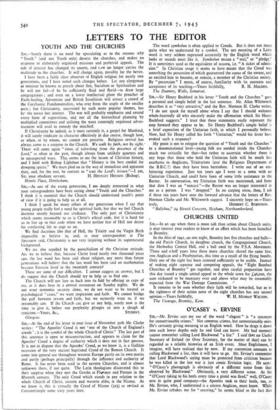SIR,—At the end of his letter in your issue of
November 30th Mr. Clarke writes: "The Apostles' Creed is not 'one of the Church of England's creeds' ; it is the symbol of the whole Church of Christ." The last part of this sentence is open to misconstruction, and appears to claim for the Apostles' Creed a degree of authority which it does not in fact possess. It is not in dispute that the Apostles' Creed, as we know it, is a Gallilan recession of the very ancient baptismal Creed of the Roman Church. It came into general use throughout western Europe partly on its own merits and partly (perhaps principally) through the influence and authority of Rome. It has never been used in the eastern Churches, and is almost unknown there, if not quite. The Latin theologians discovered this to their surprise when they met the Greeks at Flvence and Ferrare in the fifteenth century. The only Creed which stands in any relation to the whole Church of Christ, eastern and western alike, is the Nicene. As we know it, this is virtually the Creed of Nicene (325) as revised at Constantinople some sixty years later. The word symbolun is often applied to Creeds. But it does not mean quite what we understand by a symbol. The net meaning of a Latin word is very seldom expressed accurately by the English word which looks or sounds most like it. Symbolun means a "seal," or "pledge." It is sometimes used as the equivalent of tessera, i.e. "A ticket of admis- sion." In Christian usage it seems to have meant that the Creed was something the possession of which guaranteed the status of the owner, and so entitled him to become, or remain, a member of the Christian society. By " possession " I mean, of course, familiarity with its contents and
acceptance of its teaching.—Yours faithfully, R. H. MALDEN. The Deanery, Wells, Somerset.






























 Previous page
Previous page